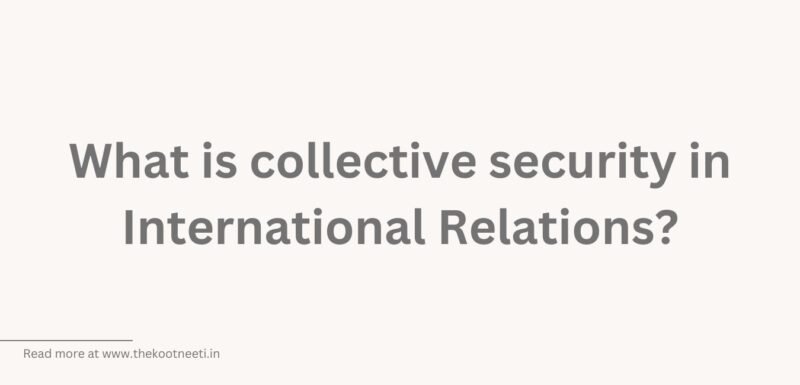What is collective security in International Relations?

Collective security is a system in international relations in which a group of states agree to cooperate in order to maintain international peace and security. It is based on the principle that an attack on one member of the group is considered an attack on all members, and that the group will take collective action to defend against the attack.
Collective security arrangements can take various forms, including regional organizations and global institutions. One of the most well-known examples of collective security is the United Nations (UN), which was established following World War II with the goal of promoting international cooperation and preventing the outbreak of future wars.
The UN has a number of mechanisms for promoting collective security, including the Security Council, which is responsible for maintaining international peace and security, and the peacekeeping operations that are deployed to conflict-affected areas around the world. The UN also has a number of specialized agencies and programs that focus on issues such as disarmament, nonproliferation, and conflict prevention.
Collective security has been seen as a potential alternative to the traditional system of balance of power, in which states rely on their own military capabilities to deter potential adversaries. However, collective security arrangements can be difficult to implement and are often subject to challenges, including the need to balance the interests of different states and the difficulty of achieving consensus on complex issues.
There are several different types of collective security arrangements, including:
- Multilateral security arrangements: These are collective security arrangements that involve multiple states working together to address security threats. Examples include the United Nations (UN) and regional organizations such as the North Atlantic Treaty Organization (NATO).
- Bilateral security arrangements: These are collective security arrangements that involve two states working together to address security threats. Bilateral security arrangements can be formal or informal, and may be based on a specific treaty or agreement.
- Collective self-defense: This is a type of collective security arrangement in which states agree to come to the defense of one another if they are attacked by another state. Collective self-defense is often based on a specific treaty or agreement, and is a key principle of the UN Charter.
- Mutual defense pacts: These are collective security arrangements in which states agree to come to the defense of one another if they are attacked by another state. Mutual defense pacts are typically bilateral in nature, and may involve the deployment of military forces or other forms of support.
There are many different types of collective security arrangements that states can use to address common security threats and promote international peace and stability. These arrangements can take a variety of forms, and may involve the participation of a single state, a group of states, or the international community as a whole.


















